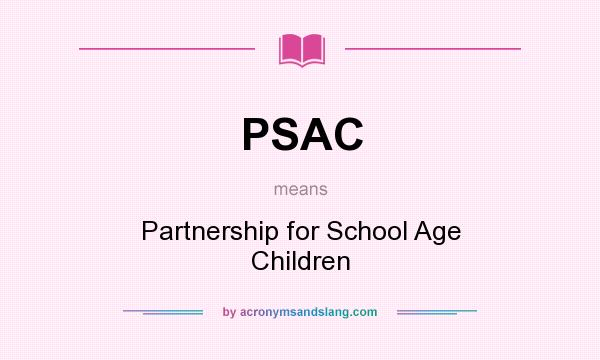What does PSAC mean?
PSAC means Partnership for School Age Children
This acronym/slang usually belongs to Undefined category.
What is the abbreviation for Partnership for School Age Children?
Partnership for School Age Children can be abbreviated as PSAC

|
|
Most popular questions people look for before coming to this page
| Q: A: |
What does PSAC stand for? PSAC stands for "Partnership for School Age Children". |
| Q: A: |
How to abbreviate "Partnership for School Age Children"? "Partnership for School Age Children" can be abbreviated as PSAC. |
| Q: A: |
What is the meaning of PSAC abbreviation? The meaning of PSAC abbreviation is "Partnership for School Age Children". |
| Q: A: |
What is PSAC abbreviation? One of the definitions of PSAC is "Partnership for School Age Children". |
| Q: A: |
What does PSAC mean? PSAC as abbreviation means "Partnership for School Age Children". |
| Q: A: |
What is shorthand of Partnership for School Age Children? The most common shorthand of "Partnership for School Age Children" is PSAC. |
Abbreviations or Slang with similar meaning
- KYCSACC - Kentucky Coalition for School Age Child Care
- FPSR - Florida Partnership for School Readiness
- KPFC - Kentucky Partnership for Families and Children
- OPSAC - Ohio Professionals for School Age Children
- OPSR - Oklahoma Partnership for School Readiness
- PACCC - Partnership for All Cherokee County Children
- PFCA - Partnership for Families Children and Adults
- PFC - Partnership for Children
- PSR - Partnership for School Readiness
- DISC - Diet Intervention of School Age Children
- LAPSNC - Los Angeles Partnership for Special Needs Children
- PCE - Partnership for Children of Essex
- PSAC - Public School Age Children
- PSDI - Partnership for School District Improvement
- PSAP - Parenting for School Age Parents
- PSIA - Partnership for the Information Age
- SAC - School Age Children
- SACC - School Age Children Care
- SPSI - Science Partnership for School Innovation
- Kiddie-SADS-E - Schedule for Affective Disorders and Schizophrenia for School-Aged Children, Epidemiologic Version